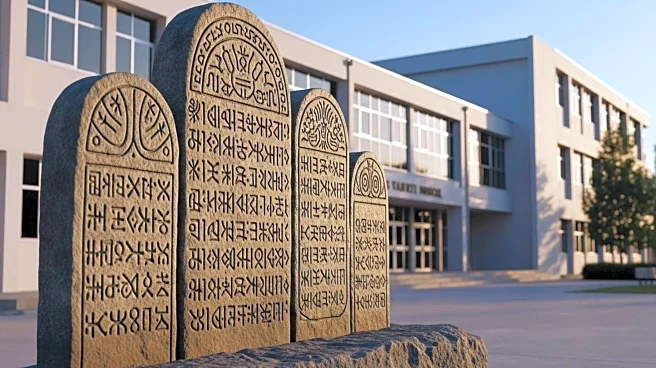What is the story about?
What's Happening?
The full U.S. Court of Appeals for the 5th Circuit has decided to review the constitutionality of Louisiana's law mandating the display of the Ten Commandments in public schools. This decision follows a previous ruling by a three-judge panel that blocked the law, citing its likely unconstitutionality under the precedent set by Stone v. Graham, a 1980 Supreme Court decision. The law, initially set to take effect on January 1, was halted by a district judge and the appellate panel. Louisiana's request for an en banc hearing, involving all judges of the 5th Circuit, was granted after several months. The court has vacated the panel's earlier decision and ordered new briefs to be filed by November 5 for the state and December 5 for the challengers, which include multi-faith or non-religious parents and their children.
Why It's Important?
The review by the full 5th Circuit could have significant implications for the separation of church and state in public education. If the court rules in favor of Louisiana, it may set a precedent that could encourage similar laws in other states, potentially altering the landscape of religious expression in public schools. The case is closely watched by both supporters and opponents of the law, with the former hoping for a favorable ruling from the court's conservative majority. The decision could also influence ongoing legal battles in Texas and Arkansas, where similar laws have been challenged. The outcome may affect public policy and civil rights, particularly regarding religious freedom and educational governance.
What's Next?
The parties involved are preparing to submit new briefs, with Louisiana's due by November 5 and the challengers' by December 5. The full 5th Circuit's decision will be pivotal in determining whether the law can be implemented. Meanwhile, Texas is seeking a similar en banc review for its Ten Commandments law, which could be influenced by the outcome of the Louisiana case. Stakeholders, including civil rights groups and state officials, are expected to closely monitor the proceedings, which could lead to further legal challenges or legislative actions depending on the court's ruling.
Beyond the Headlines
The case highlights ongoing debates about religious expression in public spaces and the interpretation of constitutional principles regarding the separation of church and state. It raises ethical questions about the role of religion in public education and the potential impact on students of diverse faiths or non-religious backgrounds. The legal proceedings may also reflect broader cultural shifts in the U.S. regarding religious freedom and educational policy.















